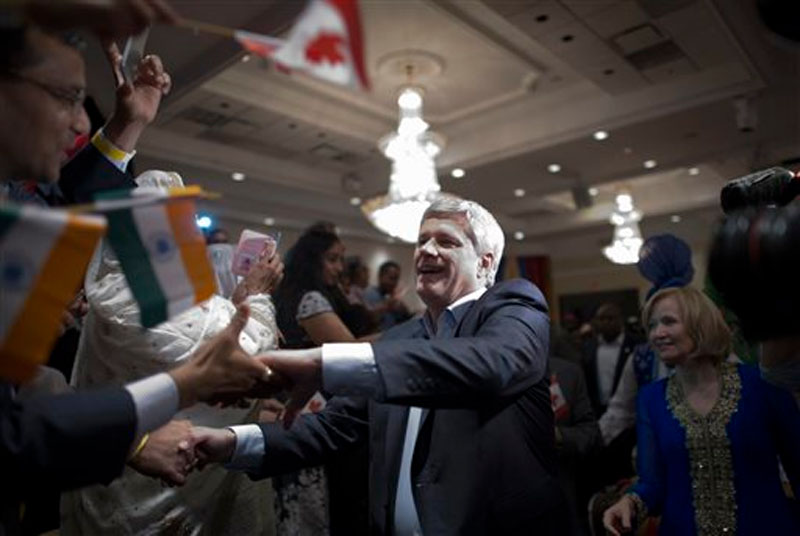Conservative Canadian leader fighting to stay in power
TORONTO: Conservative Prime Minister Stephen Harper's nearly 10 years in power could end next week, along with his dream of shattering Canada's image as a liberal bastion.
Harper, one of the longest-serving Western leaders, is seeking a rare fourth term in Monday's election but polls show him narrowly trailing Liberal leader Justin Trudeau, the son of late Prime Minister Pierre Trudeau, one of Canada's most charismatic politicians.
A Trudeau victory could ease Canada's tensions with the administration of President Barack Obama, whose reluctance to approve the Keystone XL pipeline has damaged ties between the two major trading partners. While Trudeau supports the Alberta-to-Texas pipeline, it's not a do-or-die issue like it is for Harper, who represents a district in oil-rich Alberta.
The pipeline is important to Canada, which needs infrastructure to export its growing oil sands production. But Harper's unease with Obama goes deeper, said Robert Bothwell, a Canadian history professor at the University of Toronto.
"It's ideological," he said. "Obama sees the world entirely different and Harper sees Obama and sees a liberal."
Harper has done what many thought impossible since coming to power in 2006: He won three consecutive elections and nudged a traditionally center-left country to the right. He gradually lowered sales and corporate taxes, avoided climate change legislation, supported the oil industry against environmentalists and backed Israel's right-wing government. He has put a more conservative face on the nation of 35 million, deemphasizing health care and multiculturalism as the things that make Canadians proud.
For Harper, a loss to the Liberals would be personally devastating. Former colleagues say his long-term goal is nothing short of redefining what it means to be Canadian, killing the long-held notion that the Liberals — the party of long-time leaders Pierre Trudeau and Jean Chretien — are Canada's natural party.
"His whole being is about destroying the Liberals," Bothwell said. "If Justin beats Harper, Harper will just go through the roof or maybe he'll melt like the Wicked Witch of the West."
The Liberals have increased their lead over the Conservatives by more than 7 percentage points. According to the CTV/Globe and Mail/Nanos Nightly Tracking Poll, the Liberals are at 37.1 percent, followed by the Conservatives at 29.4 percent. The New Democrats, a leftist party that moved to the center in a bid to get elected for the first time, are at 23.7 percent. The margin of error for the survey of 1,200 respondents is 2.8 percentage points.
A minority government in the 338-seat Parliament appears likely no matter which party wins the most seats. That would mean the winning party would have a shaky hold on power and need to rely on another party to pass legislation. Harper has said he'll step down as Conservative leader if his party loses.
But Antonia Maioni, a political science professor at Montreal's McGill University, is not counting Harper out, noting the Conservatives have a strong and growing base and "after 10 years of power, perhaps against all odds, is at least competitive to form a government."
Harper, 56, a sharp strategic thinker and trained economist, campaigned on the economy but was hurt when Canada entered a mild recession in the first half of the year after oil prices tumbled. Canada suffered less from the 2008 financial crisis than its southern neighbor, but Canada's economy has been outpaced by the US in recent years.
Harper then made the Islamic face veil a focus of the campaign after his government lost an attempt in court to ban the practice of wearing the niqab while swearing the oath of citizenship. Opposition leaders accused Harper of playing racial politics with an issue of little relevance to most Canadians.
Harper also declined to resettle more Syrian refugees despite the haunting image of a drowned 3-year-old washed up on a Turkish beach. The photograph of the boy drew the world's attention to the refugee crisis and hit home in Canada, where the toddler's aunt lives.
"His politics of fear and division are not worthy of a prime minister," Trudeau said.
Conservatives say Trudeau is not ready to lead. But analysts say the tall, trim 43-year-old is tapping into an appetite for change with an impressive campaign that has outflanked the New Democrats on the left.
Trudeau, a former teacher and member of Parliament since 2008, promises tax cuts for the middle class and tax hikes for the rich. He also vows to run deficits for three years to spend billions on infrastructure.
While Harper has been in power since 2006, he has held a parliamentary majority only since 2011. That year, Liberals, beset by years of infighting and ineffective leaders, had their worst electoral defeat.
Liberals governed Canada for most of the last century. Pierre Trudeau was prime minister from 1968 to 1984 with a short interruption and is responsible for Canada's version of the bill of rights. His son also has star power, though analysts say he lacks the intellectual heft of his father.
"It's certainly a battle between one man, Mr Harper, against the legacy of another man who is being represented by his son," said Maioni, the McGill professor.
Maioni said Justin Trudeau "really is his father's son. Not only in terms of his charismatic qualities and his celebrity status, but on things like multiculturalism and human rights."
If the Liberals win the most seats they're expected to rely on the New Democrats for support on a bill-by-bill basis. If the Conservatives win the most seats, the Liberals and New Democrats say they'll defeat him in a vote in Parliament, raising the possibility of a coalition government.
"I want Harper gone and I want him gone as fast as possible," New Democrat leader Tom Mulcair said.






